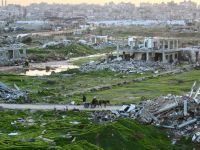King Abdullah met on Sunday with Speaker of the Iranian Parliament Mahdi Kharroubi and reviewed with him bilateral relations between the two countries, the Jordan News Agency, Petra, said.
Petra reported that King Abdullah discussed “ways to develop ties in all fields, especially those related to parliamentary and economic relations.” During the meeting, King Abdullah also underlined the importance of Iran's regional role and the support it lends to the Islamic causes, Petra added.
The two sides also reviewed scopes of launching joint ventures and means to increase the trade exchange between the two countries, the agency said. They also discussed the situation in the region, focusing on the Middle East peace process and difficulties it is facing, in addition to the situations the Islamic world is passing through.
Kharroubi, who is accompanied by Minister of Trade Mohammad Shariat Madari, conveyed to the King the greetings of the Iranian leadership, Petra said. “President Mohammad Khatami and the people of Iran are looking forward to His Majesty King Abdullah's visit to Iran,” Petra quoted Kharroubi as saying in the meeting.
King Abdullah is expected to visit Iran next month, the first by a Jordanian Monarch to that country in 20 years. Last year, King Abdullah met with President Khatami in New York on the fringes of the Millennium Summit of the United Nations.
Prior to yesterday's meeting with King Abdullah, Kharroubi, the first Iranian speaker to visit Jordan since the 1979 Islamic Revolution in Iran, met with the speakers of the Lower and Upper Houses of Parliament Abdul Hadi Majali and Zeid Rifai.
Majali said that Kharroubi's visit is part of the efforts to “cement” bilateral relations. He indicated that King Abdullah's upcoming visit to Iran will be an opportunity for a “comprehensive review” of bilateral relations. Majali commended Iran's “supportive stand on Middle Eastern causes, especially its position regarding the Palestinian problem.”
During a meeting with Jordanian lawmakers, Kharoubi said Iran is willing to boost its cultural, political and economic relations with Jordan. Kharoubi added that parliamentarians in the two countries should contribute to efforts aimed at enhancing these relations.
“There is a will by the two sides to move the relationship forward and the two countries have undertaken many steps in that direction,” Kharoubi said. “We hope that agreements signed by the two sides will be implemented.”
Since the 1990s, Jordan and Iran have made slow but sure steps to restore their ties, severed after the start of the eight-year Iran-Iraq war, in which Tehran accused Jordan of siding with Iraq. Following the resumption of ties, the two sides undertook several measures to boost relations, especially in trade ties.
Last October, Iran's Industry Minister Gholam Reza Shafi'e led Iran's delegation to the meetings of the Jordan-Iran Higher Committee, which was convened in Amman. The most significant outcome of that meeting was Iran's expressed interest in partially financing the Disi Water conveyance system, which holds the promise of an additional 100 million cubic meters supplied to Amman via a pipeline running from the ancient Disi aquifer in the south.
Iran's proposal included supplying Jordan with the needed pipes in exchange for Jordanian Potash and phosphate. Observers believe that Iran's proposal is “more serious” than the Libyan offer, which has been repeatedly pledged by Libyan Leader Muammar Qadhafi, although no action has been taken.
Kharoubi, who also met with Prime Minister Ali Abul Ragheb, said that no peace could be achieved in the region before “ending Israeli occupation of Palestinian territories and the return of millions of Palestinian refugees to British-mandate Palestine.”
“Rights of return [to Palestine] and self-determination are very important to comprehensive peace. Palestinians have the right to establish their homeland with Jerusalem as its capital,” Kharoubi said in his meting with the Lower House members. “The Muslim world should play a role in the efforts to liberate Palestine,” he added.
“[Muslims] cannot abandon even a small piece of land in Jerusalem or any part of Palestine,” the Iranian official said. “Iran does not believe that unilateral agreements [with Israel] can bring peace or ensure the stability and security of the region,” Kharoubi told Jordanian lawmakers.
Iran has opposed any peace deal with Israel and called for the annihilation of the Jewish state. The Iranian official said that Muslim parliamentarians should spare no effort at international gatherings of parliaments to defend the rights of the Palestinians.
On the other hand, Minister of Trade and Industry Wasif Azar discussed with Share'at Madari ways to encourage joint investments and boost the volume of trade exchange between the two countries, which did not exceed 20 million Jordanian dinars () last year.
Azar and Share'at Madari also discussed the activation of trade agreements and the possibility of a new accord to avoid dual taxation. Azar said that a Jordanian delegation will leave for Iran “soon” to discuss Iran's participation in the Disi project. — ( Jordan Times )
By Tareq Ayyoub
© 2001 Mena Report (www.menareport.com)







